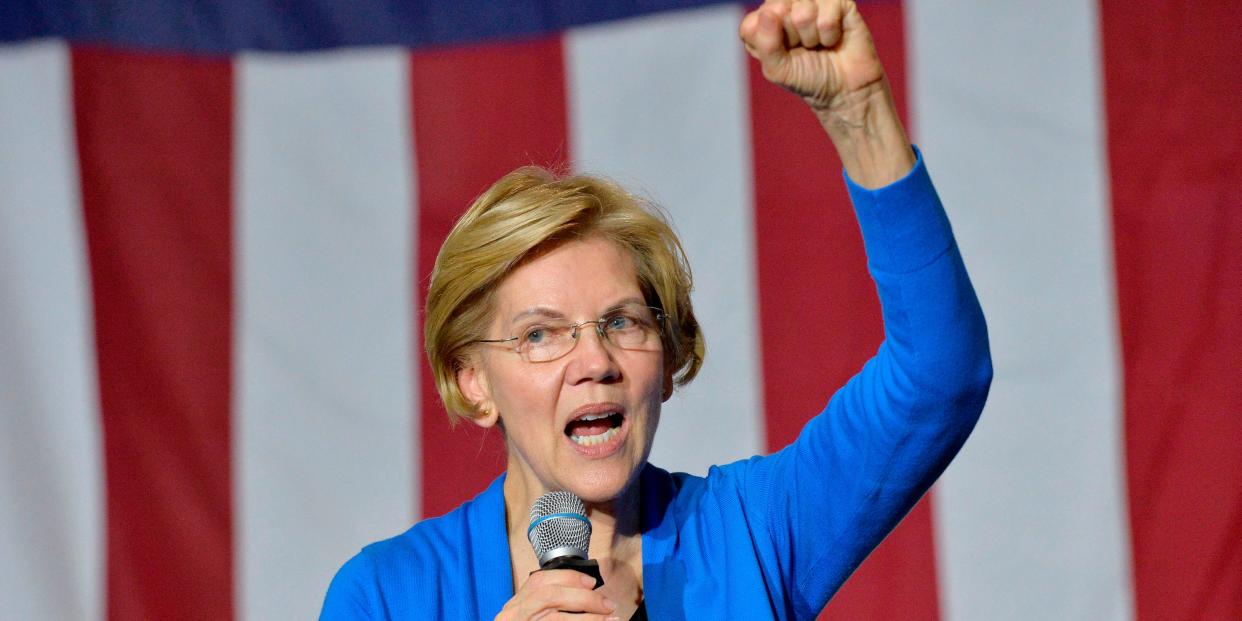Elizabeth Warren's proposed wealth tax will raise $1 trillion less than expected and slow the economy, study finds

Joseph Prezioso/Getty Images
Sen. Elizabeth Warren's proposed wealth tax would set back US economic growth by 0.9% in 2050, a study released Thursday found, possibly undercutting the signature plan helping to power her progressive campaign for the White House.
The analysis from the Penn Wharton Budget Model, a nonpartisan research institution at the University of Pennsylvania, also estimated that Warren's plan would raise $2.3 trillion to $2.7 trillion in revenue from fiscal 2021 to 2030. That's significantly less than her campaign forecast.
Richard Prisinzano, the director of policy analysis at the Penn Wharton Budget Model, told Business Insider the study assumed that the wealthiest citizens would pay it and ultimately invest less in the economy, leading to a slowdown in its growth.
The study is likely to face criticism among some economists who argue that the Penn Wharton Budget Model downplays the possible economic boost from Warren's sweeping agenda.
Sen. Elizabeth Warren's proposed wealth tax would set back US economic growth by 0.9% in 2050, a study released Thursday found, possibly undercutting the signature plan helping to power her progressive campaign for the White House.
The analysis from the Penn Wharton Budget Model, a nonpartisan research institution at the University of Pennsylvania, also estimated that Warren's plan would raise $2.3 trillion to $2.7 trillion in revenue from fiscal 2021 to 2030. While a significant amount, the estimate is much less than the campaign's revenue projection of $3.75 trillion.
Richard Prisinzano, the director of policy analysis at the Penn Wharton Budget Model, told Business Insider the study assumed that the wealthiest citizens would pay the tax and ultimately invest less in the economy, leading to a slowdown in its growth.
"Rather than reduce their consumption, they're going to pay that tax out of savings. And because they're reducing savings, it shrinks the economy, and GDP goes down," Prisinzano said.
The estimate of a 0.9% cut in gross domestic product relied on the scoring conventions used by the Congressional Budget Office, where additional government revenue generated from plans is directed toward reducing the deficit — a move that bolsters growth in the study's framework.
"Paying down debt is the best you can do in terms of how much the economy shrinks," Prisinzano said. "Unless you assume that the productivity boost you're going to get from the program is really big."
Prisinzano also said the lower revenue forecast resulted from fewer tax dollars going to government coffers because of lower wages in a shrunken economy; the study estimated that wages in 2050 would drop by 0.8% to 2.3%.
The study's authors, though, conceded that without specific legislative language they couldn't fully analyze how billionaires might avoid the wealth tax, and they noted that the Warren campaign has stressed that "significant enforcement efforts" would be in place. They relied on studying the tax behavior of the richest citizens now.
Warren's wealth-tax plan would kick in for Americans with net worths over $50 million, with households paying a 2% annual tax on their assets like stocks, yachts, real estate — everything they own. It would ramp up to 6% for fortunes totaling over $1 billion.
Her campaign has said it would use the revenue to fund her plans for universal childcare, tuition-free college, and drastically reducing student debt. She recently doubled the top tax rate to 6% to help cover the cost of her "Medicare for All" proposal.

Sarah Rice/Getty Images
The study also attempted to model the effect of tax revenue spent on government programs with both positive and neutral productivity outcomes.
It projected that while Warren's wealth tax would be a drag on growth regardless of the program the revenue is spent on, it would stifle growth at a lesser rate if revenue were directed toward a program that boosted workers' productivity.
If revenue were spent on a program that improved productivity, the tax plan would cut the nation's GDP by 1.1% in 2050, compared with a 2.1% cut if it went toward a program that didn't affect productivity.
"An investment in early childhood education might lead to additional labor-market dynamics that boost the economy," the study said, though it maintained that "a considerable amount of wealth inequality in the United States has historically been driven by entrepreneurship, a factor that has received very little attention in tax models and analysis."
The Warren campaign fired back at the analysis, pointing back to its $3.75 trillion forecast that was backed up by other economists and calling the analysis' conclusions "meaningless."
"This analysis does not study Elizabeth's actual plans — it does not account for the strong anti-evasion measures in her wealth tax and does not even attempt to analyze the specific investments Elizabeth is committed to making with the wealth tax revenue," Saloni Sharma, a campaign representative, told Business Insider in an email. "This is an analysis of a different and worse plan than Elizabeth's, using unsupportable assumptions about how the economy works, and its conclusions are meaningless."
The study is likely to face criticism from some economists who argue the Penn Wharton Budget Model downplays the possible economic boost from Warren's sweeping agenda.
Emmanuel Saez, an economist who helped design Warren's wealth tax plan, told Business Insider last month that the proposal wouldn't hurt the economy's production of goods and services.
"The Penn Wharton model assumes that the wealth tax reduces the capital stock of the economy as revenue is simply used to pay down debt," he said in an email. "But if revenue is used for productive public investments such as public infrastructure, it would not necessarily reduce the capital stock."
Mark Zandi, an economist who also analyzed the wealth tax for the Massachusetts senator's campaign, wrote last month for CNN that "Warren's plans for child care, housing and green manufacturing would spur economic growth and produce more tax revenue."
Read the original article on Business Insider

